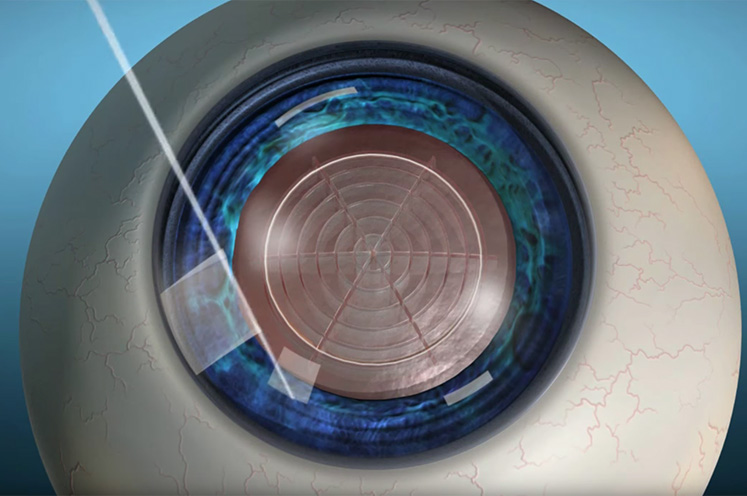Laser Cataract Surgery
Laser cataract surgery uses the latest technology for enhanced customization and precision.
If you have been diagnosed with a cataract and need surgical treatment, you may choose from two types of surgery, laser cataract surgery or traditional cataract surgery. Refractive cataract surgery is often referred to as Laser assisted cataract surgery, though it also may be performed without laser.
What is laser cataract surgery?
Laser-assisted cataract surgery, more commonly known as laser cataract surgery, uses an image-guided system to enhance the customization and precision of cataract treatment. Henry Ford ophthalmologists perform laser cataract surgeries using the LenSx® system, the first laser cleared for use in cataract surgery.
Carl’s Story
How does laser cataract treatment differ from traditional cataract surgery?
Both types of surgery follow the same basic steps:
- Capsulotomy: A small, circular incision is made in the front of your eye’s capsule.
- Lens fragmentation: The cataract is softened and broken up.
- Lens replacement: Your old lens is removed and a new intraocular lens is implanted in your eye.
However, laser cataract surgery automates several of these steps and offers several other features, including:
- Enhanced customization: The laser system uses an advanced visualization technology to make a high-resolution, 3-D map of your eye, improving accuracy in the surgical plan.
- Improved precision: In traditional cataract surgery, all eye incisions are made manually. Making incisions with the laser can help to ensure a greater level of precision, which may improve visual outcomes.
- Less ultrasound energy: By using the laser to fragment the cataract, ultrasound is required for less time than during traditional cataract treatment. This can reduce the heat build-up in the eye, which may decrease the risk of complications.
- Refractive prescription: During traditional cataract surgery, surgeons measure visual acuity through preoperative exams, using this information to determine the replacement lens prescription. During laser cataract surgery, however, your Henry Ford surgeon will use an intraoperative tool known as the ORA System®. With ORA, your surgeon can verify the correct prescription for your replacement lens during surgery, and this tool may also be used to help control astigmatism. Ultimately, this may reduce the likelihood of needing glasses after surgery.
CareCredit Financing
In an effort to make vision surgery accessible to more people, Henry Ford offers several financing options for you and your family. This includes accepting the CareCredit® credit card, which may be used to pay for laser cataract surgery.
Refractive lens exchange
For those patients who do not have cataracts but who do have the common, age-related vision loss known as presbyopia, refractive lens exchange may be an option. During this procedure, which is available using the same technology as laser cataract treatment, Henry Ford surgeons exchange a pre-cataractous lens with an intraocular lens (IOL) to correct a refractive error in a patient who may not be a candidate for PRK or LASIK.
At Henry Ford, patients come first.
The Henry Ford Department of Ophthalmology is committed to providing our patients with compassionate, personalized care. We feature the most advanced treatments in eye care and are dedicated to vision research – always staying at the forefront of innovation. A leader in Michigan, as well as one of the largest ophthalmology practices in the United States, we treat more than 55,000 patients per year at 14 locations throughout southeast Michigan. In addition, our team works closely with Henry Ford Medical Group physicians in other departments, providing multidisciplinary, coordinated care for those patients who need it.
.svg?iar=0&hash=F6049510E33E4E6D8196C26CCC0A64A4)

/hfh-logo-main--white.svg?iar=0&hash=ED491CBFADFB7670FAE94559C98D7798)

